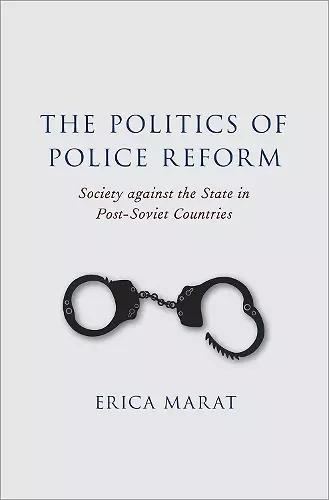The Politics of Police Reform
Society against the State in Post-Soviet Countries
Format:Hardback
Publisher:Oxford University Press Inc
Published:19th Apr '18
Currently unavailable, and unfortunately no date known when it will be back

There is a Russian saying that "police mirror society." The gist of this is that every society is policed to the extent that it allows itself to be policed. Centralized in control but decentralized in their reach, the police are remarkably similar in structure, chain of command, and their relationships with the political elite across post-Soviet nations--they also remain one of the least reformed post-communist institutions. As a powerful state organ, the Soviet-style militarized police have resisted change despite democratic transformations in the overall political context, including rounds of competitive elections and growing civil society. While consensus between citizens and the state about reform may be possible in democratic nations, it is considerably more difficult to achieve in authoritarian states. Across post-Soviet countries, such discussions most often occur between political elites and powerful non-state actors, such as criminal syndicates and nationalistic ethnic groups, rather than the wider citizenry. Even in countries where one or more rounds of democratic elections have taken place since 1991, empowered citizens and politicians have not renegotiated the way states police and coerce society. On the contrary, in many post-Soviet countries, police functions have expanded to serve the interests of the ruling political elites. What does it take to reform a post-Soviet police force? This book explores the conditions in which a meaningful transformation of the police is likely to succeed and when it will fail. Departing from the conventional interpretation of the police as merely an institution of coercion, this book defines it as a medium for state-society consensus on the limits of the state's legitimate use of violence. It thus considers policing not as a way to measure the state's capacity to coerce society, but rather as a reflection of a complex society bound together by a web of casual interactions and political structures. The book compares reform efforts in Ukraine, Georgia, Kyrgyzstan, Kazakhstan, and Tajikistan, finding that bottom-up public mobilization is likely to emerge in the aftermath of transformative violence--an incident when the usual patterns of policing are interrupted with unprecedented brutality against vulnerable individuals. Ultimately, The Politics of Police Reform examines the various pathways to transforming how the state relates to society through policing.
In her book, The Politics of Police Reform: Society against the State in Post-Soviet Countries (Oxford University Press, 2018), Erica Marat provides an answer to a very important question: "What does it take to reform a post-Soviet police force?"... The book is valuable reading for those following contemporary issues in Central Asia and the post-Soviet space, as well those interested broadly in the problems of police violence and the challenge of police reform. * Nicholas Seay, The Ohio State University, New Books Network *
The Politics of Police Reform is a significant contribution to the study of policing both within and beyond the former Soviet Union. Marat's local knowledge and expertise shine through the case studies, and the book is peppered with insights from interviews with local reformers, activists and officials. It will be of interest to anyone studying broader questions about the production of social order and the role of the police in society. This lucid, tightly argued and provocative book brings the conversation much further forward. * Gavin Slade, Europe-Asia Studies *
In this excellent and wide-ranging comparative study, Erica Marat shows that police reform should be understood as an ongoing and iterative process of negotiation between state and society about the limits of state power, rather than as a concrete set of institutional changes. This book is a must-read for anyone who wants to learn more about the stops and starts of post-Soviet police reform and the meaningful role that societal actors can and do play in this reform process. * Lauren McCarthy, author of Trafficking Justice: How Russian Police Enforce New Laws, from Crime to Courtroom *
Erica Marat has turned the cold light of her insightful analysis on two critical and interrelated problems, the role of extreme police violence in provoking police reform in autocratic states and the manner in which regime-centric, donor assistance can derail this democratic process. The book is an essential read for those concerned with civil society's struggle to transform authoritarian policing in former Soviet republics and in comparative regimes in Africa, Asia, the Middle East, and Latin America. * Robert M. Perito, former Director, Center of Innovation for Security Sector Transformation, United States Institute of Peace *
Marat's study yields implications that should interest policing scholars outside the post-Soviet region. First, by operationalizing police reform as a process, and identifying two key variables that seem to inflect that process, she provides a theoretical framework that may be relevant as far afield as, say, debates about police in the United States. * Matthew Light, University of Toronto, The Journal of Power Institutions in Post-Soviet Societies *
Marat's notable contribution to the study of police reform is an emphasis on a bottom-up rather than top-down dynamic in the reform process. The book is strongly recommended for graduate students and researchers." * CHOICE *
ISBN: 9780190861490
Dimensions: 163mm x 236mm x 25mm
Weight: 499g
264 pages